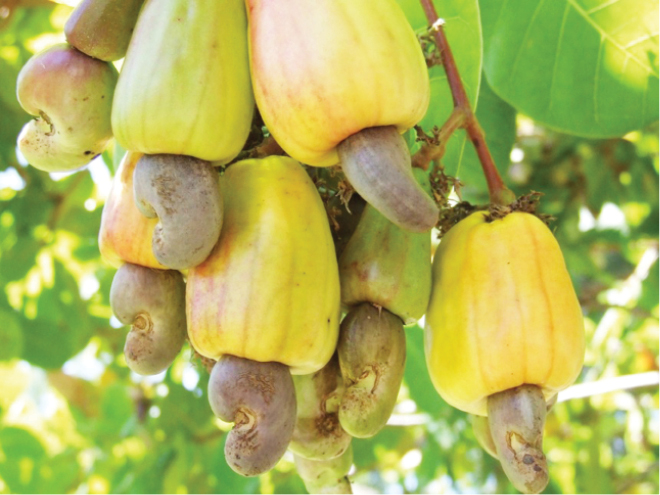By Grace Adetutu
In Nigeria, cashew remains an integral part of the country’s industrial and export crops, providing support to over 300,000 families and sustaining 600, 0000 jobs.
According to statistics from the International Trade Centre, 80 per cent of raw cashew nuts from the country are exported to India and Vietnam, adding that “it is generally admitted that the Nigerian cashew industry is currently earning about N150 million locally, and raw cashew exports provide yearly some other US$ 182.5m.”
- FCT polls results: How APC, PDP won, loss
- I want to succeed Buhari, but don’t want to step on his toes – Tinubu
It is estimated that Nigeria has approximately 600,000 cashew trees, but only few domestic companies are involved in the local processing of cashew nuts, which necessitates the 80 percent of the nuts produced in Nigeria to be exported.
Unekwuojo A. Edime, President of Association of Cashew Farmers, Aggregators and Processors of Nigeria, in an exclusive interview with Daily Trust on Sunday, disclosed that the state of cashew production in Nigeria is still good.
“We are still second in Africa even though there are conflicting figures. I believe that we are second, the other countries said to be producing more than Nigeria is Cote d’Ivoire. I believe that some of the products they are taking credit for are still products from Nigeria,” Mr. Edime said.
He added, “we believe this year, the harvest will be higher than last year because of the favorable weather. From what we already see on the farm; the yields, the flowering, this year yields will be higher than last basically because of the weather,” he stated.
The Nigerian cashew market is dominated by smallholder farmers. The local processing sector employs around 25,000 people which is progressively expanding, while exports are increasing due to improved knowledge of export possibilities. The current market can be divided into two separate markets:
“For the processed one, the market is steady. The market is good for the big scale processors while for small scale processors, they are struggling basically because most of their products are consumed locally and Nigeria doesn’t pay much for cashew in the local market, but the big processors who export are doing well,” the cashew farmers’ leader said.
Despite the increase in production, the market does not have an existing regulatory policy to guide the operations of the industry. This contributes to some of the factors hindering small scale farmers and exporters.
“Most cashew are planted by small-holder farmers, and these farmers do not use improved seedlings. Most of the farms, particularly the ones in the east, north central, Kogi area, still use wild variety. They pick from their farms and plant instead of planting improved seedling and it ultimately affects the yield at the end of the day.”
According to Mr. Unekwuojo, “the industry is unstructured, and farmers don’t really get support to maintain their farms, so there are a lot of farms not well taken care of and a lot of harvest get lost to the weed. For now, the post-harvest handling project has improved and the quality is improving because of that.”
“For the aggregators, processors, exporters, the market is unstructured. For exporters, one of the major things that affect them is that when you export your product, you can’t really have direct access to your fund and when you do, you get it at the official market rate, while at the parallel market, it’s far higher than that. As an exporter, after exporting you’re losing close to N100 per dollar.
“The federal ministry of Agric is currently developing a policy document, a five-year developing plan for the cashew industry. I’m sure all stakeholders – the CBN, ministry of agric, National Assembly everybody is being brought on board and we believe at the end of the assignment, we can have a good policy for cashews development in Nigeria,” he explained.
Speaking on the price of cashew for both local and international markets, he said: “the price for the raw cashew nut is appreciating. We can’t view the industry holistically for now because harvest is just starting, trading is about to start even though people are still doing minor trades. The flag off hasn’t been done yet. Officially, trading in raw cashew nuts has not started this year so it will be premature to start analyzing the industry at this point.”
For now, farmers sought their seedlings themselves, and there’s no major support as at date. The only organization, according to him, that brings support is the United States Department of Agriculture in partnership with Federal Ministry of Agriculture through Agric programme aimed at improved seedling for onward transmission to the farmers, adding that “we notice that when people get things free, they don’t value it. We believe that farmers should pay little for getting these improved seedlings. For now, farmers basically source their seedling by themselves.”
He suggested solutions that can help curb some of these long-standing problems in the industry: “Where to start is to assist farmers with cashew plantation maintenance. The government should introduce improved seedling, take more steps in making improved seedling that is valuable to farm and also bring a lot of attention to extension services where the farmers will be trained on farm management of their plantation so that they can get value for the existing one and then equally plant improved seedlings that will increase production and the quality.
“Tree crops, like I keep telling people, should be treated like assets rather than this perennial crop tree crops like cocoa, cashew, rubber, kola nut when you plant you can still keep for up to 20-50 years after planting so there should be a policy that this plantation can be used to access facilities.”

 Join Daily Trust WhatsApp Community For Quick Access To News and Happenings Around You.
Join Daily Trust WhatsApp Community For Quick Access To News and Happenings Around You.

